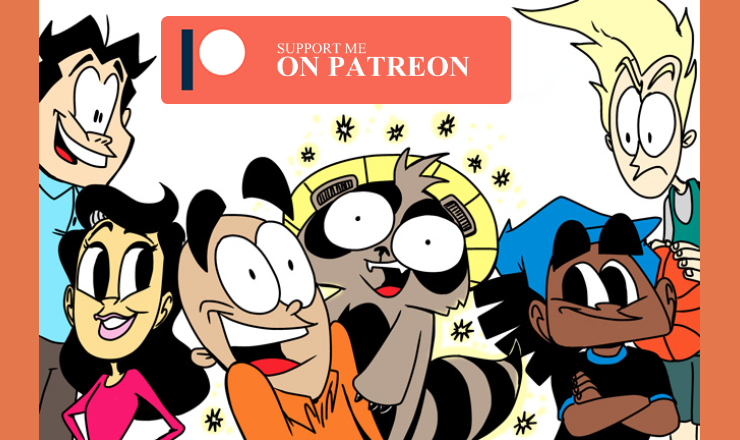3 Reasons to Stop Caring About Making Money From Writing
/Share your work for free as often as you can.
Illustration by the author.
Writing only for money is a waste of time.
There’s nothing wrong with wanting to earn dollars for your articles or sell millions of copies of your book—it shouldn’t be your main goal, though.
As a writer, teacher, and cartoonist, I’ve spent the past twenty years making money from what I love and also putting a ton of creative work out for free. The free stuff I shared was more fun and fulfilling than when I was paid mainly because I could do what I wanted and didn’t have to worry about pleasing anyone.
Rarely was I able to mix making money with something I had a passion for, like my comic strip Little Fried Chicken and Sushi. The strip started as a free webcomic about my experiences living in Japan, and I posted it online for four years, then it got syndicated online by Andrews McMeel Publishing.
Creating the comic was a labor of love, and I enjoyed the freedom to write my story and characters however I wanted. The delightful combination of writing and drawing together, which every cartoonist loves, stayed for many years, even with a wider audience reading.
I learned what it takes to consistently create content every week for years. One thing always rang true—you can’t only care about making money. Here are several ways to focus less on your bank account and more on the pleasure of writing.
1. Write because it’s fun
You get more out of it when you write for the joy of writing. Even if you’re someone in dire straits, who must get paid asap, get a job, any job to help pay your bills, to keep that joy alive while writing on the side. Don’t worry, your creativity will keep on popping.
Art is about creating for the sake of just that, creation.
We live in a time where you have the ability and means to create because it’s fun. There are still plenty of places on this planet where people are struggling in their living conditions or are in the middle of surviving a war.
If you’re reading this, there’s a good chance you have the opportunity to make stuff where and when you want. People in your family tree are smiling at all they worked hard to accomplish so you can have the freedom to write.
Work a job, write on the side until something connects with readers, and you can eventually leave it if you choose.
You’re not alone as someone who wants a successful career as a writer. It’s not uncommon for literary agents to receive anywhere from five thousand to twenty thousand query letters from authors seeking representation for their book manuscripts each year. Only a handful make it to a release through a major publishing house.
I’m not saying this to bring you down, just to throw a dose of reality onto your fire.
Whether you’re a successful writer or not, you will continue writing. I’ve had ups and downs, and still, I draw and write every day. Writing articles like this one feels good, and I also enjoy laughing when I finally come up with a funny gag for a comic strip.
I have a relationship, or marriage, with my creative interests that will last no matter how well I’m doing financially. I’ve been broke making my art and also know what it’s like to get a salary from making my art.
Both situations required I work continuously on improving my skills by doing the work. You’ve got to find the fun in creating daily to keep going even when times are tough.
2. Write to help others
Writing for yourself is fine, and if you’re working on a novel, it can be pretty rewarding. Creating stories that inspire others or articles to help people learn and grow in their lives can bring more fun to your writing practice.
Putting your work out into the world for free as often as possible will help you get noticed. When you inspire others, bringing value to people, even one person, you will reap the benefits.
Sometimes, it’s just one thank you email response or comment on your article from someone you helped. You’re instantly connected and feel a sense of true purpose. So, it’s not always money that motivates. Glowing with the knowledge, you helped another person—or thousands—get what they want out of life or feel more a part of theirs is transformational.
Not everyone can buy your books or pay to read what you’ve written online. Thanks to the internet, giving it away for free online makes it accessible to all and can reach more people who need your words.
You’ll be surprised at how much helping others helps you.
3. Write to heal yourself
I hear creatives whining about how difficult it is to write. If it’s so hard, why write at all? You could be watching TV or playing video games.
Could it be writing helps you feel better? It helps you process events in your life and understand your place in it? Maybe that’s a good reason to push through the pain of a problematic article draft or the frustration of a paragraph not coming together how you hoped.
Writing puts the pieces together in your mind and can mend your heart.
Does this sound like something that needs money to be worthwhile? You, putting your whole self into what you create makes it special.
Creating is never a waste of time, no matter how disappointed you may become with your results. You may think burnout or giving up on writing happens when you work too much. Actually, investing emotionally and then not getting a return on your investment is the problem.
When you can accept your mental healing as a valuable return, your fulfillment for helping others, and enjoyment with the process of writing as payment for your time, you’ll feel more satisfied.
Did you notice I didn’t highlight much about how writing all the time helps your skills grow? I’m sure you already know. Actually, it could be a whole article of its own. If you want to get better at something, do it every day. One more key to add is to do it with the intention of getting better.
And you will.
If something you wrote takes off, garners millions of readers, and makes you boatloads of money, magnificent. The rewards will taste sweeter because you know you did it for love, not money.
Want more? If you’re struggling with doing original work, click here to join my (free) email list, and through comics, articles about culture, and living your truth, you can learn to share your art with the world.









